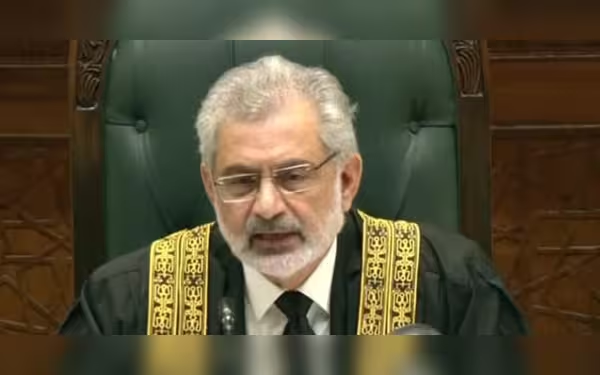Saturday, November 16, 2024 05:44 PM
CJP Qazi Faez Isa Addresses Justice Mansoor Ali Shah's Concerns
- CJP responds to Justice Shah's letter on committee concerns.
- Justice Shah emphasizes collegial decision-making importance.
- Exclusion of Justice Muneeb Akhtar raises integrity questions.
 Image Credits: thefrontierpost
Image Credits: thefrontierpostCJP Qazi Faez Isa addresses Justice Mansoor Ali Shah's concerns over judicial committee practices and decision-making integrity.
In recent developments within the Pakistani judiciary, Chief Justice of Pakistan (CJP) Qazi Faez Isa has addressed a letter from Justice Mansoor Ali Shah concerning the Practice and Procedure Committee. This situation arose after Justice Shah expressed his refusal to attend a meeting of the Supreme Court Practice and Procedure Committee, citing serious concerns regarding a presidential ordinance that has implications for judicial processes.
Justice Mansoor Ali Shah's letter highlighted specific objections, particularly the exclusion of Justice Muneeb Akhtar from the committee. This exclusion has raised eyebrows and sparked discussions about the integrity and inclusiveness of judicial decision-making. Justice Shah emphasized that the principle of collegial decision-making is vital for the judiciary, stating, "The principle of collegial working stands as a cornerstone for ensuring justice, fairness, and the larger good of the people who seek its intervention." He further argued that concentrating ultimate administrative powers in the hands of a single individual, such as the Chief Justice, undermines the ideals of democratic governance and judicial fairness.
While the details of CJP Isa's response remain undisclosed, the exchange between the two justices marks a significant moment in the ongoing discourse about judicial practices in Pakistan. The concerns raised by Justice Shah reflect a broader apprehension regarding the balance of power within the judiciary and the need for collaborative decision-making.
This situation serves as a reminder of the importance of transparency and inclusivity in judicial processes. As the judiciary plays a crucial role in upholding the rule of law and protecting citizens' rights, it is essential that all voices within the system are heard and considered. The ongoing dialogue between justices not only highlights the challenges faced by the judiciary but also underscores the commitment to ensuring that justice is served fairly and equitably.













